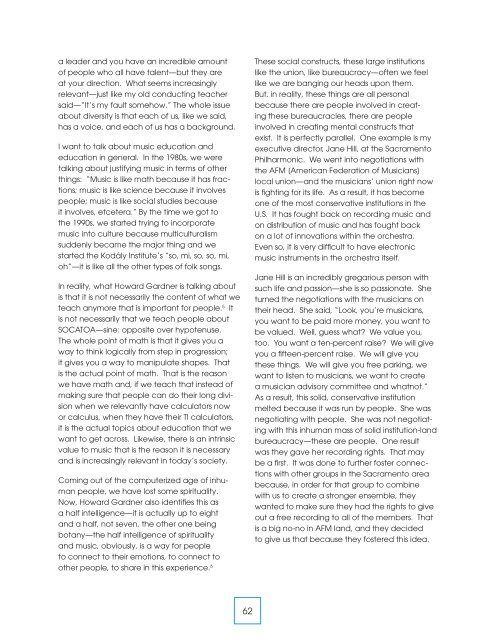The New Face of Arts Leadership in the West - westaf - The Western ...
The New Face of Arts Leadership in the West - westaf - The Western ...
The New Face of Arts Leadership in the West - westaf - The Western ...
Create successful ePaper yourself
Turn your PDF publications into a flip-book with our unique Google optimized e-Paper software.
a leader and you have an <strong>in</strong>credible amount<br />
<strong>of</strong> people who all have talent—but <strong>the</strong>y are<br />
at your direction. What seems <strong>in</strong>creas<strong>in</strong>gly<br />
relevant—just like my old conduct<strong>in</strong>g teacher<br />
said—“It’s my fault somehow.” <strong>The</strong> whole issue<br />
about diversity is that each <strong>of</strong> us, like we said,<br />
has a voice, and each <strong>of</strong> us has a background.<br />
I want to talk about music education and<br />
education <strong>in</strong> general. In <strong>the</strong> 1980s, we were<br />
talk<strong>in</strong>g about justify<strong>in</strong>g music <strong>in</strong> terms <strong>of</strong> o<strong>the</strong>r<br />
th<strong>in</strong>gs: “Music is like math because it has fractions;<br />
music is like science because it <strong>in</strong>volves<br />
people; music is like social studies because<br />
it <strong>in</strong>volves, etcetera.” By <strong>the</strong> time we got to<br />
<strong>the</strong> 1990s, we started try<strong>in</strong>g to <strong>in</strong>corporate<br />
music <strong>in</strong>to culture because multiculturalism<br />
suddenly became <strong>the</strong> major th<strong>in</strong>g and we<br />
started <strong>the</strong> Kodály Institute’s “so, mi, so, so, mi,<br />
oh”—it is like all <strong>the</strong> o<strong>the</strong>r types <strong>of</strong> folk songs.<br />
In reality, what Howard Gardner is talk<strong>in</strong>g about<br />
is that it is not necessarily <strong>the</strong> content <strong>of</strong> what we<br />
teach anymore that is important for people. 5 It<br />
is not necessarily that we teach people about<br />
SOCATOA—s<strong>in</strong>e: opposite over hypotenuse.<br />
<strong>The</strong> whole po<strong>in</strong>t <strong>of</strong> math is that it gives you a<br />
way to th<strong>in</strong>k logically from step <strong>in</strong> progression;<br />
it gives you a way to manipulate shapes. That<br />
is <strong>the</strong> actual po<strong>in</strong>t <strong>of</strong> math. That is <strong>the</strong> reason<br />
we have math and, if we teach that <strong>in</strong>stead <strong>of</strong><br />
mak<strong>in</strong>g sure that people can do <strong>the</strong>ir long division<br />
when we relevantly have calculators now<br />
or calculus, when <strong>the</strong>y have <strong>the</strong>ir TI calculators,<br />
it is <strong>the</strong> actual topics about education that we<br />
want to get across. Likewise, <strong>the</strong>re is an <strong>in</strong>tr<strong>in</strong>sic<br />
value to music that is <strong>the</strong> reason it is necessary<br />
and is <strong>in</strong>creas<strong>in</strong>gly relevant <strong>in</strong> today’s society.<br />
Com<strong>in</strong>g out <strong>of</strong> <strong>the</strong> computerized age <strong>of</strong> <strong>in</strong>human<br />
people, we have lost some spirituality.<br />
Now, Howard Gardner also identifies this as<br />
a half <strong>in</strong>telligence—it is actually up to eight<br />
and a half, not seven, <strong>the</strong> o<strong>the</strong>r one be<strong>in</strong>g<br />
botany—<strong>the</strong> half <strong>in</strong>telligence <strong>of</strong> spirituality<br />
and music, obviously, is a way for people<br />
to connect to <strong>the</strong>ir emotions, to connect to<br />
o<strong>the</strong>r people, to share <strong>in</strong> this experience. 6<br />
<strong>The</strong>se social constructs, <strong>the</strong>se large <strong>in</strong>stitutions<br />
like <strong>the</strong> union, like bureaucracy—<strong>of</strong>ten we feel<br />
like we are bang<strong>in</strong>g our heads upon <strong>the</strong>m.<br />
But, <strong>in</strong> reality, <strong>the</strong>se th<strong>in</strong>gs are all personal<br />
because <strong>the</strong>re are people <strong>in</strong>volved <strong>in</strong> creat<strong>in</strong>g<br />
<strong>the</strong>se bureaucracies, <strong>the</strong>re are people<br />
<strong>in</strong>volved <strong>in</strong> creat<strong>in</strong>g mental constructs that<br />
exist. It is perfectly parallel. One example is my<br />
executive director, Jane Hill, at <strong>the</strong> Sacramento<br />
Philharmonic. We went <strong>in</strong>to negotiations with<br />
<strong>the</strong> AFM [American Federation <strong>of</strong> Musicians]<br />
local union—and <strong>the</strong> musicians’ union right now<br />
is fight<strong>in</strong>g for its life. As a result, it has become<br />
one <strong>of</strong> <strong>the</strong> most conservative <strong>in</strong>stitutions <strong>in</strong> <strong>the</strong><br />
U.S. It has fought back on record<strong>in</strong>g music and<br />
on distribution <strong>of</strong> music and has fought back<br />
on a lot <strong>of</strong> <strong>in</strong>novations with<strong>in</strong> <strong>the</strong> orchestra.<br />
Even so, it is very difficult to have electronic<br />
music <strong>in</strong>struments <strong>in</strong> <strong>the</strong> orchestra itself.<br />
Jane Hill is an <strong>in</strong>credibly gregarious person with<br />
such life and passion—she is so passionate. She<br />
turned <strong>the</strong> negotiations with <strong>the</strong> musicians on<br />
<strong>the</strong>ir head. She said, “Look, you’re musicians,<br />
you want to be paid more money, you want to<br />
be valued. Well, guess what? We value you,<br />
too. You want a ten-percent raise? We will give<br />
you a fifteen-percent raise. We will give you<br />
<strong>the</strong>se th<strong>in</strong>gs. We will give you free park<strong>in</strong>g, we<br />
want to listen to musicians, we want to create<br />
a musician advisory committee and whatnot.”<br />
As a result, this solid, conservative <strong>in</strong>stitution<br />
melted because it was run by people. She was<br />
negotiat<strong>in</strong>g with people. She was not negotiat<strong>in</strong>g<br />
with this <strong>in</strong>human mass <strong>of</strong> solid <strong>in</strong>stitution-land<br />
bureaucracy—<strong>the</strong>se are people. One result<br />
was <strong>the</strong>y gave her record<strong>in</strong>g rights. That may<br />
be a first. It was done to fur<strong>the</strong>r foster connections<br />
with o<strong>the</strong>r groups <strong>in</strong> <strong>the</strong> Sacramento area<br />
because, <strong>in</strong> order for that group to comb<strong>in</strong>e<br />
with us to create a stronger ensemble, <strong>the</strong>y<br />
wanted to make sure <strong>the</strong>y had <strong>the</strong> rights to give<br />
out a free record<strong>in</strong>g to all <strong>of</strong> <strong>the</strong> members. That<br />
is a big no-no <strong>in</strong> AFM land, and <strong>the</strong>y decided<br />
to give us that because <strong>the</strong>y fostered this idea.<br />
62


